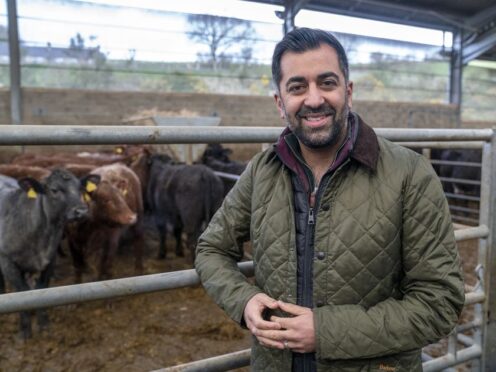Humza Yousaf has accused the UK Government of inflicting “significant damage” on rural Scotland.
The SNP leader is set to visit a lambing farm in Stornoway, in the Western Isles, to highlight calls for a rural visa pilot scheme to tackle the impacts of Brexit and depopulation.
It is designed to allow some rural businesses to recruit foreign nationals easily to help with a shortage of workers.
Proposals were outlined by Scottish ministers in September 2022 and received backing from organisations including the National Farmers Union (NFU) Scotland – but it was not rubber-stamped by Westminster, which controls immigration policies.
Mr Yousaf, who will be joined by the SNP’s Na h-Eileanan an Iar Westminster candidate Susan Thomson, said: Businesses and farms across Scotland’s rural and island communities have shown enormous resilience in recent years and are invaluable to communities like the one I am visiting today.
“They are a hallmark of the skill, dedication and ingenuity that runs throughout Scotland, and we must do what we can to support them so that they continue to be so. That is why the SNP proposed a rural visa pilot scheme.”

Mr Yousaf went on to say the proposals would mitigate against labour shortages “which are a direct consequence of Brexit and hostile Tory immigration policies”.
He said there has been “no meaningful engagement from Westminster”, adding: “Instead, this Tory Government has continued to pursue a toxic combination of Brexit red tape, the ending of freedom of movement and hostile Tory immigration policies – despite the significant damage this is doing to our rural industries and communities.
“A rural visa pilot would go a long way to addressing this, however ultimately Scotland must look to a brighter future as an independent country that is once again a member of the EU.”
The SNP leader added that rural communities have been “repeatedly betrayed” by the UK Government, urging voters to “send a message” at the general election.
Scottish Conservative rural affairs spokeswoman Rachael Hamilton described Mr Yousaf as “central-belt focused” and said the SNP has “abandoned” rural communities, claiming they have not upgraded the A9, A96 and A75 roads.
She added: “His party have also produced a threadbare agriculture Bill and are in coalition with the anti-farming, anti-fishing Greens.
“They have made Scotland the highest-taxed part of the UK and, coupled with a lack of homes in rural areas, it puts people off coming here.
“It is no wonder Humza Yousaf’s party are losing support right across Scotland, including in our rural communities.
“Voters in the north and south of Scotland know that it is only the Scottish Conservatives who can beat the SNP in these crucial seats, deliver a fair deal for rural Scotland and get the focus onto people’s real priorities.”
A UK Government spokesperson said: “Immigration is a UK Government reserved matter and the points-based immigration system works in the interest of the whole of the UK.
“De-population in rural areas of Scotland can’t be remedied by immigration as rural areas may struggle to retain migrants for the same reasons as with the local population.
“Investment in jobs and infrastructure, which devolved administrations have powers to address, must be considered.”
